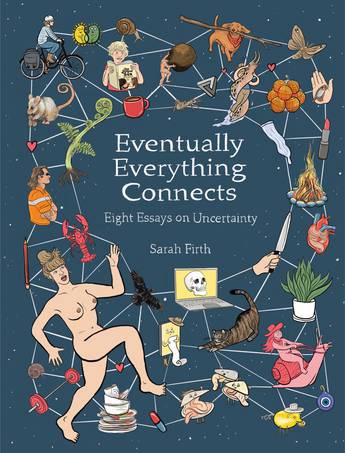This series of graphic essays begins in monochrome, which the narrator’s cat coming to her in the middle of the night. His “black paw beans stick to my person palm” and they merge, then dissemble, prompting Sarah to consider existential questions around labour and purpose. A “cat bickie” chart reveals three-quarters of her time is spent doing mundane stuff, an eighth fun stuff, an eight shit stuff; not the proportions she wishes to be living, and begins a search for better living (ironically, part of her search involves watching dogs at the park, “the masters of living with gusto”. Research does show people with cats have poorer wellbeing — maybe that means more realistic — than dog owners … These essays are full of sly, cat-person knowingness).
Firth continues to explore such questions over the following seven essays: the trappings of being online, sex and desire, nostalgia and growing up, revolutionary change, routine and habits, selfhood and the limits of empathy. Pervasive concerns throughout include the climate and extinction crisis, political disenchantment, the exploitation of living under capitalism, the rise of existential despair, all closely linked of course. Bogong Moths flit through the pages, taking a starring role in the second essay, Like A Moth To A Flame, in which Firth goes camping with her sister’s family and the adults battle to keep the kids off screens, all the while glued to phones themselves. A moth flies into the fire; one of the kids asks why they are so “stupid”? “I’m a resource being exploited,” Firth wonders, like the moths that are gathered by Aboriginal people from their mountain caves.
Firth is drawn to the remarkable journeys of these moths, which make their way from grasslands in eastern Australia to the mountains every summer in their millions upon millions, enough to clog cities. But they are also a portent of the terrifying and unpredictable changes western society has wrought to the planet, with populations crashing by 99.5% in recent years (they have recovered somewhat since). How can such a thing possibly happen? We all know climate change is intensifying, but such events might shock us out of the stasis of the familiar. In State Of Emergency, which addresses these crises head on and wonders at revolutionary change, Firth calls for a “both/and” approach: “those who tend, mend, maintain and nurture … and those who disrupt, disturb and reform”.
Firth recalls encountering the moths in Yarralumla as a teenager exploring a local brickworks. Throughout these essays she draws on memoir, including her childhood and adolescence, desire, living with disability and illness. This is particularly effective in We Were Here, which explores her memories of growing up in Canberra, where the illustrations speak some of the things that cannot be put in words, and Desire Lines, in which Firth recounts sexual adventures with amusing and poignant honesty, identifying her desires as “a very common manifestation of wondering what it’s like to be another person”. “Sometimes you need to fuck around and find out,” she writes (also very here for her leaning into her “slutty bad boi James Dean persona” as a response to being called a slut at school).
That yearning to cross the borders that separate individuals and species pervades these essays, made literal in Firth’s gorgeous, whimsical illustration. One highlight a morning coffee run ritual (involving Firth and her partner returning to the backyard to drink and converse naked, as I think all weekend coffee runs must now be conducted) which becomes a conversation on revolutionary politics and Firth riding a worm naked into a compost heap. Another is a gorgeous foodweb of the relationships between all the creatures in a backyard, undercut with her cat thinking “kill them all”; or Firth’s imagining of her neighbours as reptiles. My favourite page are simply panels with little text depicting the variety of experience whether labour and leisure, including a delightful portrait of marine iguanas lounging together, or snapshots of her childhood with all the pain and love that entails.
Gay rating: 3/5 for some queer themes and relationships.
